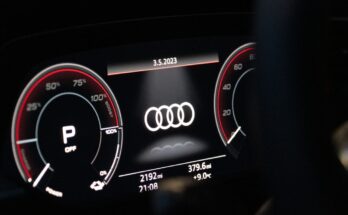Proper tire maintenance is essential for vehicle safety and performance. Maintaining correct tire pressure is a key aspect of this maintenance. Underinflated tires can decrease fuel efficiency, cause uneven wear, and impair handling.
Overinflated tires may also lead to uneven wear and reduced traction. It is recommended to check tire pressure monthly and adjust to manufacturer-specified levels. Regular tire inspections are important to identify signs of wear and damage.
Worn or damaged tires pose safety risks and can negatively impact fuel efficiency. Look for uneven tread wear, cracks, bulges, or punctures, and replace tires showing damage. Tire rotation is another crucial maintenance task.
Rotating tires every 6,000 to 8,000 miles promotes even wear and extends their lifespan. Proper tire maintenance not only ensures vehicle safety and performance but also contributes to fuel efficiency. Correct tire pressure, regular inspections, and rotations can maximize fuel efficiency and reduce the frequency of tire replacements.
Well-maintained tires improve vehicle handling and traction, particularly in adverse weather conditions. By investing time in tire maintenance, vehicle owners can reduce fuel costs, extend tire life, and ensure long-term vehicle safety and performance.
Key Takeaways
- Proper tire maintenance is crucial for safety and fuel efficiency, including regular tire pressure checks and rotations.
- Efficient driving techniques such as smooth acceleration and braking can significantly improve fuel economy.
- Regular engine maintenance, including oil changes and air filter replacements, can improve fuel efficiency and extend the life of the vehicle.
- Minimizing excess weight in the vehicle can improve fuel efficiency, so remove unnecessary items from the trunk or backseat.
- Using the correct fuel for your vehicle can optimize performance and fuel efficiency, so always follow the manufacturer’s recommendations.
- Limiting idling time can save fuel and reduce emissions, so turn off the engine if you anticipate a long wait.
- Planning efficient routes can save time and fuel, so use GPS or maps to avoid traffic and unnecessary detours.
Efficient Driving Techniques
Efficient driving techniques can significantly improve your vehicle’s fuel efficiency and reduce its environmental impact. By adopting a few simple habits, you can make a big difference.
Avoid Aggressive Driving
One of the most important efficient driving techniques is to avoid aggressive driving behaviors such as speeding, rapid acceleration, and hard braking. These behaviors can significantly reduce fuel efficiency and increase wear and tear on your vehicle. Instead, try to accelerate and brake gradually and maintain a steady speed while driving.
Minimize Idling Time
Another efficient driving technique is to avoid excessive idling. Idling for extended periods wastes fuel and contributes to unnecessary emissions. If you anticipate being stopped for more than a minute, it’s more fuel-efficient to turn off your engine and restart it when you’re ready to move again.
Maintain a Consistent Speed
Efficient driving techniques also include maintaining a consistent speed and using cruise control when appropriate. By maintaining a consistent speed, you can help improve fuel efficiency by reducing the need for frequent acceleration and deceleration. Using cruise control on highways can also help maintain a steady speed and improve fuel efficiency by reducing fluctuations in speed.
By incorporating these efficient driving techniques into your daily driving habits, you can help maximize your vehicle’s fuel efficiency and reduce your environmental impact.
Regular Engine Maintenance
Regular engine maintenance is essential for ensuring the longevity and performance of your vehicle. One of the most important aspects of engine maintenance is changing the oil regularly. Engine oil lubricates the moving parts of the engine and helps reduce friction and wear.
Over time, engine oil can become contaminated with dirt and debris, which can reduce its effectiveness. It’s important to follow the manufacturer’s recommended oil change intervals and use the correct type of oil for your vehicle. Additionally, it’s important to replace the air filter regularly to ensure that the engine receives a sufficient amount of clean air for combustion.
A dirty air filter can restrict airflow to the engine, which can reduce fuel efficiency and performance. Regular engine maintenance also includes checking and replacing spark plugs as needed. Spark plugs play a crucial role in igniting the air-fuel mixture in the engine’s cylinders.
Over time, spark plugs can become fouled or worn out, which can lead to misfires and reduced fuel efficiency. It’s important to inspect spark plugs regularly and replace them according to the manufacturer’s recommendations. Finally, it’s important to have the engine’s fuel system inspected and cleaned periodically to ensure that it operates efficiently.
By staying on top of regular engine maintenance tasks such as oil changes, air filter replacements, spark plug inspections, and fuel system cleanings, you can help maximize your vehicle’s fuel efficiency and performance while also extending its lifespan.
Minimize Excess Weight
| Category | Metric | Value |
|---|---|---|
| Body Weight | Initial Weight | 180 lbs |
| Body Weight | Target Weight | 160 lbs |
| Exercise | Weekly Workouts | 5 times |
| Diet | Calories Intake | 1500 kcal/day |
Minimizing excess weight in your vehicle can help improve fuel efficiency and reduce unnecessary strain on your vehicle’s engine and brakes. Carrying around excess weight in your vehicle can increase fuel consumption, especially during stop-and-go driving or when driving uphill. It’s important to remove any unnecessary items from your vehicle, such as sports equipment, tools, or other heavy items that you don’t need for your trip.
Additionally, if you have a roof rack or cargo carrier installed on your vehicle, consider removing it when it’s not in use to reduce aerodynamic drag and improve fuel efficiency. In addition to removing excess weight from your vehicle, it’s also important to avoid using your vehicle as a storage space for heavy items that you don’t need for your trip. Carrying around unnecessary weight not only reduces fuel efficiency but also increases wear and tear on your vehicle’s suspension, brakes, and tires.
By taking the time to remove excess weight from your vehicle and only carrying what you need for your trip, you can help improve fuel efficiency, reduce unnecessary strain on your vehicle, and save money on fuel costs in the long run.
Use the Correct Fuel
Using the correct fuel for your vehicle is essential for ensuring optimal performance and fuel efficiency. It’s important to use the type of fuel recommended by the manufacturer for your specific make and model of vehicle. Using the wrong type of fuel can lead to reduced performance, decreased fuel efficiency, and potential damage to the engine over time.
Additionally, it’s important to avoid using lower-octane fuel than what is recommended for your vehicle. Using lower-octane fuel can lead to engine knocking or pinging, which can negatively impact performance and fuel efficiency. In addition to using the correct type of fuel, it’s also important to purchase high-quality fuel from reputable gas stations.
High-quality fuel can help keep your engine clean and operating efficiently, while low-quality or contaminated fuel can lead to engine deposits and reduced performance over time. By using the correct type of fuel recommended by the manufacturer and purchasing high-quality fuel from reputable gas stations, you can help ensure optimal performance and fuel efficiency for your vehicle.
Limit Idling Time

Save Fuel and Reduce Emissions
Limiting idling time is an important way to improve fuel efficiency and reduce unnecessary emissions from your vehicle. Idling for extended periods wastes fuel and contributes to air pollution. If you anticipate being stopped for more than a minute, it’s more fuel-efficient to turn off your engine and restart it when you’re ready to move again.
The Benefits of Reducing Idling Time
This simple habit can help reduce unnecessary fuel consumption and emissions while also saving you money on fuel costs in the long run. In addition to limiting idling time while parked or waiting in traffic, it’s also important to avoid warming up your vehicle for an extended period before driving.
Modern Engines Don’t Need Warming Up
Modern engines are designed to warm up quickly while driving, so there’s no need to let your vehicle idle for an extended period before hitting the road.
Make a Positive Impact on the Environment
By limiting idling time whenever possible, you can help improve fuel efficiency, reduce unnecessary emissions, and minimize your environmental impact.
Plan Efficient Routes
Planning efficient routes can help minimize unnecessary mileage, reduce travel time, and improve fuel efficiency. Before heading out on a trip, take some time to plan your route using a GPS or mapping app that takes traffic conditions into account. By avoiding congested routes or road construction whenever possible, you can help minimize stop-and-go driving and reduce unnecessary idling time.
Additionally, planning efficient routes can help you avoid getting lost or making wrong turns, which can add unnecessary mileage to your trip. In addition to planning efficient routes using a GPS or mapping app, it’s also helpful to consolidate errands and appointments into a single trip whenever possible. By combining multiple stops into one trip, you can help minimize overall mileage and reduce fuel consumption.
Planning efficient routes not only saves you time but also helps improve fuel efficiency and reduce unnecessary wear and tear on your vehicle. In conclusion, proper tire maintenance, efficient driving techniques, regular engine maintenance, minimizing excess weight, using the correct fuel, limiting idling time, and planning efficient routes are all important ways to improve fuel efficiency and reduce environmental impact while driving. By incorporating these practices into your daily driving habits, you can help maximize your vehicle’s fuel efficiency, save money on fuel costs, reduce emissions, and contribute to a cleaner environment for future generations.
If you’re looking to improve your car’s fuel economy, you may also be interested in learning about the latest car models and their fuel efficiency. Check out AlbumCars for reviews and information on the most fuel-efficient vehicles on the market. This can help you make an informed decision when it comes to purchasing a new car that will save you money on gas in the long run.
FAQs
What is fuel economy?
Fuel economy refers to the efficiency of a vehicle in using fuel to travel a certain distance. It is typically measured in miles per gallon (MPG) for gasoline-powered vehicles and in miles per gallon equivalent (MPGe) for electric vehicles.
Why is improving fuel economy important?
Improving fuel economy is important for reducing fuel costs, decreasing greenhouse gas emissions, and conserving natural resources. It also helps to reduce the overall environmental impact of driving.
What are some tips for improving fuel economy?
Some tips for improving fuel economy include maintaining proper tire pressure, using the recommended grade of motor oil, driving at a steady speed, avoiding excessive idling, and keeping the vehicle well-maintained.
How does driving behavior affect fuel economy?
Aggressive driving behaviors such as speeding, rapid acceleration, and hard braking can significantly reduce fuel economy. Driving at a steady speed, using cruise control on the highway, and anticipating stops can help improve fuel efficiency.
What role does vehicle maintenance play in fuel economy?
Proper vehicle maintenance, including regular oil changes, air filter replacements, and tune-ups, can help ensure that the engine operates efficiently, which in turn can improve fuel economy.
Are there any modifications that can improve fuel economy?
Some modifications, such as installing a more aerodynamic body kit or using low rolling resistance tires, can potentially improve fuel economy. However, it’s important to research and consider the potential impact on the vehicle’s warranty and performance before making any modifications.



